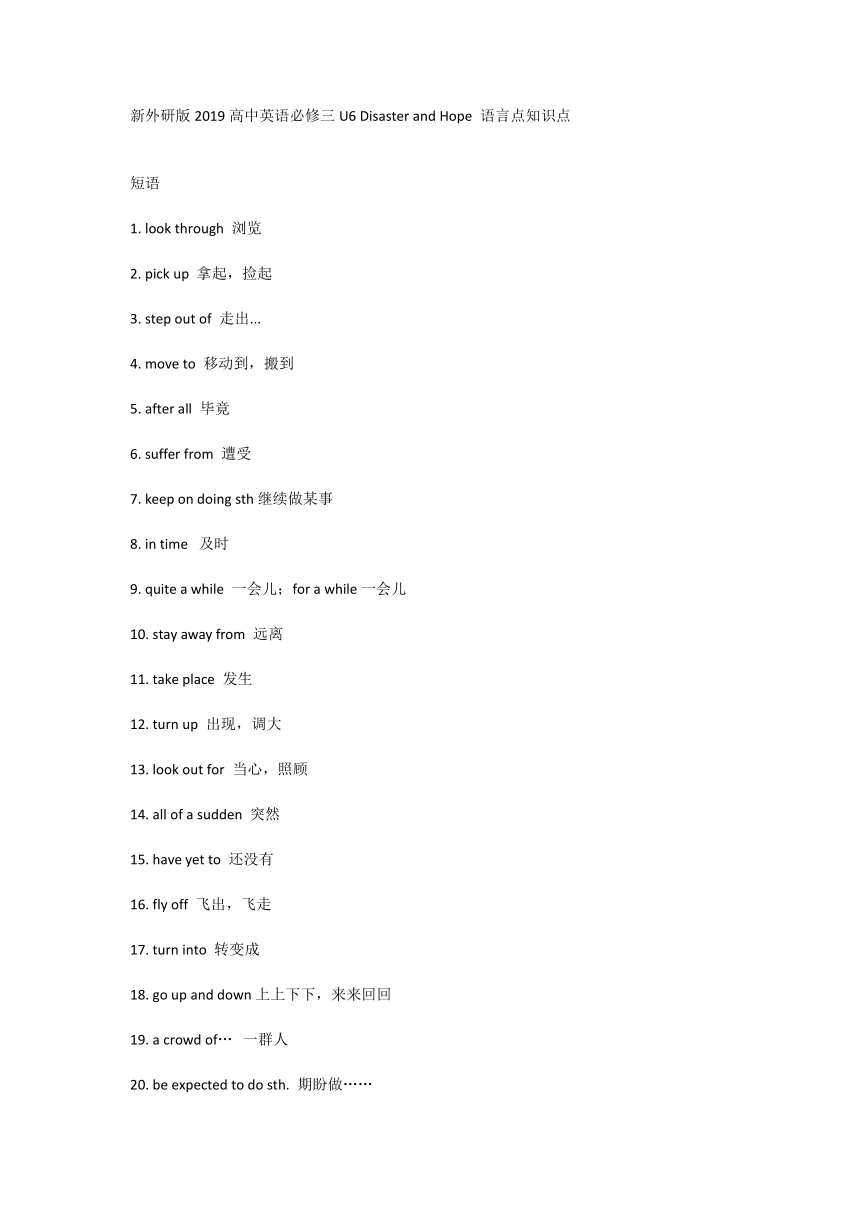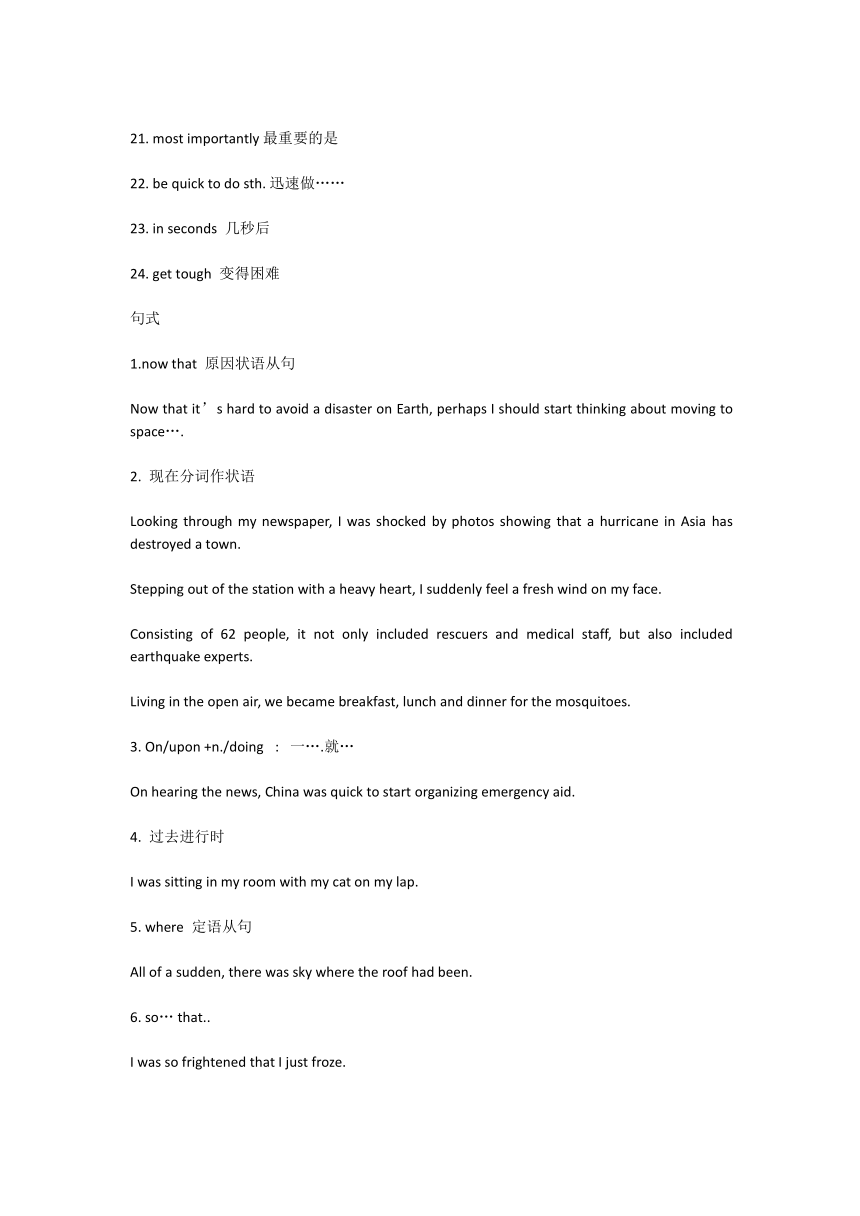Unit 6 Disaster and hope 知识清单(讲义)-2024-2025学年高一英语外研版(2019)必修第三册
文档属性
| 名称 | Unit 6 Disaster and hope 知识清单(讲义)-2024-2025学年高一英语外研版(2019)必修第三册 |

|
|
| 格式 | docx | ||
| 文件大小 | 20.1KB | ||
| 资源类型 | 教案 | ||
| 版本资源 | 外研版(2019) | ||
| 科目 | 英语 | ||
| 更新时间 | 2025-01-29 16:46:49 | ||
图片预览


文档简介
新外研版2019高中英语必修三U6 Disaster and Hope 语言点知识点
短语
1. look through 浏览
2. pick up 拿起,捡起
3. step out of 走出...
4. move to 移动到,搬到
5. after all 毕竟
6. suffer from 遭受
7. keep on doing sth 继续做某事
8. in time 及时
9. quite a while 一会儿;for a while 一会儿
10. stay away from 远离
11. take place 发生
12. turn up 出现,调大
13. look out for 当心,照顾
14. all of a sudden 突然
15. have yet to 还没有
16. fly off 飞出,飞走
17. turn into 转变成
18. go up and down 上上下下,来来回回
19. a crowd of… 一群人
20. be expected to do sth. 期盼做……
21. most importantly 最重要的是
22. be quick to do sth. 迅速做……
23. in seconds 几秒后
24. get tough 变得困难
句式
1.now that 原因状语从句
Now that it’s hard to avoid a disaster on Earth, perhaps I should start thinking about moving to space….
2. 现在分词作状语
Looking through my newspaper, I was shocked by photos showing that a hurricane in Asia has destroyed a town.
Stepping out of the station with a heavy heart, I suddenly feel a fresh wind on my face.
Consisting of 62 people, it not only included rescuers and medical staff, but also included earthquake experts.
Living in the open air, we became breakfast, lunch and dinner for the mosquitoes.
3. On/upon +n./doing : 一….就…
On hearing the news, China was quick to start organizing emergency aid.
4. 过去进行时
I was sitting in my room with my cat on my lap.
5. where 定语从句
All of a sudden, there was sky where the roof had been.
6. so… that..
I was so frightened that I just froze.
7. the moment引导时间状语从句
He had disappeared the moment the storm hit.
语法:省略句(重在理解)
1. 简单句中的省略
1) 省略主语:祈使句通常省略主语
(You) Shut up!住嘴! (It) Doesn't matter.没关系。
2) 省略宾语:当上、下或前后两个句子的宾语一致时,下句或后句常省略宾语。
—Do you know Miss Gao —I don't know (her).
3) 省略主语和谓语(或谓语的一部分):在某些具体的场合下,主语和谓语都很明确,此时为了简化或显得亲切等,可将主语和谓语(或谓语的一部分)同时省略,只剩下表语、宾语、状语或其他成分。
(You come) This way, please. 请这边走。(省略了主语和谓语)
(Have you) Got any ink 你有墨水吗?(省略了主语和谓语的一部分)
2. 并列句中的省略
1) 省略主语或宾语:当后面主语或宾语与前面一部分相同时,可以省略后一部分中共同的主语或宾语。
Tom picked up a book on the floor and (Tom) handed it to his teacher.
2) 省略系动词、助动词或情态动词:当主语不同,而谓语部分的系动词,助动词或情态动词相同,则省略后面的系动词、助动词或情态动词。
Jack must have been playing football and Mary (must have been) doing her homework.
3) 省略主谓成分:当主语与谓语动词相同,则省略后面的主谓成分。
His advice made me happy, but (his advice made) Jim angry.
4) 若主语不同,但主要动词及后续部分相同,则省略主要动词及后续部分。
He has a knowledge of first aid but his friend doesn't (have a knowledge of first aid).
3. 状语从句中的省略
1) 在when, while, if, as if, though, although, as, until, once, whether, unless, whenever等连接的状语从句中,当从句谓语中含有系动词be,且从句主语跟主句的主语相同或从句的主语为it时,则从句中主语和be动词常被省略。
Wood gives off much smoke while (it is) burning.
Whenever (it is) possible, they would stop him and ask him the three questions.
2) 在than, as等引导的比较状语从句中常省略某些固定成分。
They don't use more water than (it is) necessary.
He runs as fast as Bob (runs).
4. 定语从句中的省略:在限制性定语从句中,关系代词在从句中作宾语时可省略。
5. 宾语从句中的省略:宾语从句中常省略连接词that
6. 动词不定式的省略
1)用于某些使役动词,如:make, let, have等和感官动词,如:see, watch, notice, observe, hear等后面作宾补的不定式须省略to,但在被动语态中,to不省略。
We often hear her sing an English song in the classroom.
She is often heard to sing an English song in the classroom. (被动语态)
2) 并列的不定式可以省略后面的不定式符号to。但若两个不定式之间表示对比或比较关系时,不能省略to。
He likes to swim and (to) skate. (并列)
He believes it's important to study rather than to make friends. (比较)
3) 介词but, except (除了) 前有实义动词do的某种形式时,后面的不定式不带to。
All he could do was nothing but wait and see.
7. 介词的省略:一些与动词、名词或形容词搭配的介词常常可以省略,而保留分词后的动名词。常见的结构有:
be busy (in) doing sth. have difficulty/trouble (in) doing sth.
spend some time (in) doing sth. stop/prevent sb. (from) doing sth.
短语
1. look through 浏览
2. pick up 拿起,捡起
3. step out of 走出...
4. move to 移动到,搬到
5. after all 毕竟
6. suffer from 遭受
7. keep on doing sth 继续做某事
8. in time 及时
9. quite a while 一会儿;for a while 一会儿
10. stay away from 远离
11. take place 发生
12. turn up 出现,调大
13. look out for 当心,照顾
14. all of a sudden 突然
15. have yet to 还没有
16. fly off 飞出,飞走
17. turn into 转变成
18. go up and down 上上下下,来来回回
19. a crowd of… 一群人
20. be expected to do sth. 期盼做……
21. most importantly 最重要的是
22. be quick to do sth. 迅速做……
23. in seconds 几秒后
24. get tough 变得困难
句式
1.now that 原因状语从句
Now that it’s hard to avoid a disaster on Earth, perhaps I should start thinking about moving to space….
2. 现在分词作状语
Looking through my newspaper, I was shocked by photos showing that a hurricane in Asia has destroyed a town.
Stepping out of the station with a heavy heart, I suddenly feel a fresh wind on my face.
Consisting of 62 people, it not only included rescuers and medical staff, but also included earthquake experts.
Living in the open air, we became breakfast, lunch and dinner for the mosquitoes.
3. On/upon +n./doing : 一….就…
On hearing the news, China was quick to start organizing emergency aid.
4. 过去进行时
I was sitting in my room with my cat on my lap.
5. where 定语从句
All of a sudden, there was sky where the roof had been.
6. so… that..
I was so frightened that I just froze.
7. the moment引导时间状语从句
He had disappeared the moment the storm hit.
语法:省略句(重在理解)
1. 简单句中的省略
1) 省略主语:祈使句通常省略主语
(You) Shut up!住嘴! (It) Doesn't matter.没关系。
2) 省略宾语:当上、下或前后两个句子的宾语一致时,下句或后句常省略宾语。
—Do you know Miss Gao —I don't know (her).
3) 省略主语和谓语(或谓语的一部分):在某些具体的场合下,主语和谓语都很明确,此时为了简化或显得亲切等,可将主语和谓语(或谓语的一部分)同时省略,只剩下表语、宾语、状语或其他成分。
(You come) This way, please. 请这边走。(省略了主语和谓语)
(Have you) Got any ink 你有墨水吗?(省略了主语和谓语的一部分)
2. 并列句中的省略
1) 省略主语或宾语:当后面主语或宾语与前面一部分相同时,可以省略后一部分中共同的主语或宾语。
Tom picked up a book on the floor and (Tom) handed it to his teacher.
2) 省略系动词、助动词或情态动词:当主语不同,而谓语部分的系动词,助动词或情态动词相同,则省略后面的系动词、助动词或情态动词。
Jack must have been playing football and Mary (must have been) doing her homework.
3) 省略主谓成分:当主语与谓语动词相同,则省略后面的主谓成分。
His advice made me happy, but (his advice made) Jim angry.
4) 若主语不同,但主要动词及后续部分相同,则省略主要动词及后续部分。
He has a knowledge of first aid but his friend doesn't (have a knowledge of first aid).
3. 状语从句中的省略
1) 在when, while, if, as if, though, although, as, until, once, whether, unless, whenever等连接的状语从句中,当从句谓语中含有系动词be,且从句主语跟主句的主语相同或从句的主语为it时,则从句中主语和be动词常被省略。
Wood gives off much smoke while (it is) burning.
Whenever (it is) possible, they would stop him and ask him the three questions.
2) 在than, as等引导的比较状语从句中常省略某些固定成分。
They don't use more water than (it is) necessary.
He runs as fast as Bob (runs).
4. 定语从句中的省略:在限制性定语从句中,关系代词在从句中作宾语时可省略。
5. 宾语从句中的省略:宾语从句中常省略连接词that
6. 动词不定式的省略
1)用于某些使役动词,如:make, let, have等和感官动词,如:see, watch, notice, observe, hear等后面作宾补的不定式须省略to,但在被动语态中,to不省略。
We often hear her sing an English song in the classroom.
She is often heard to sing an English song in the classroom. (被动语态)
2) 并列的不定式可以省略后面的不定式符号to。但若两个不定式之间表示对比或比较关系时,不能省略to。
He likes to swim and (to) skate. (并列)
He believes it's important to study rather than to make friends. (比较)
3) 介词but, except (除了) 前有实义动词do的某种形式时,后面的不定式不带to。
All he could do was nothing but wait and see.
7. 介词的省略:一些与动词、名词或形容词搭配的介词常常可以省略,而保留分词后的动名词。常见的结构有:
be busy (in) doing sth. have difficulty/trouble (in) doing sth.
spend some time (in) doing sth. stop/prevent sb. (from) doing sth.
